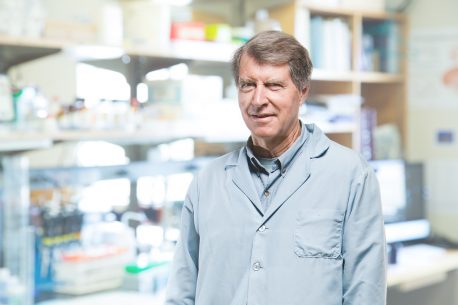La Jolla CA— Renowned cell biologist and Salk Professor David Schubert passed away on August 6 at the age of 77 in La Jolla, California. He was known for the development of novel screening techniques that allowed his team to identify naturally occurring chemicals that can slow or prevent the neurological damage that occurs in neurodegenerative disorders, such as Alzheimer’s disease.
“We are deeply saddened by the news of Dave’s passing. He was one of the earliest graduate students at Salk and spent close to 55 years of his scientific career here,” says Salk President Rusty Gage, “Dave will be greatly missed and we are forever thankful for his contributions to our research community.”
Jan Lewerenz, a senior physician at Ulm University Hospital, in Germany, and one of Schubert’s former postdoctoral researchers, adds, “I will remember Dave as one of the best human beings I had the privilege to know. Without him my life would have been different. Whenever I have to deal with ‘slimeballs,’ I am reminded of his integrity and honesty. The world, now more than ever, is in desperate need of people like Dave. He will always be my role model for how to navigate the murky waters of academic research without selling one’s soul.”

Schubert was born in 1943 in Indianapolis, Indiana, and earned his BA in chemistry from the University of Indiana in 1965. He first came to Salk later that year as a graduate student in the lab of late Salk professor and immunologist Melvin Cohn, while working on his PhD in cell biology at UC San Diego. Schubert then moved to the Pasteur Institute, in Paris, for his postdoctoral fellowship under the direction of Nobel Laureate François Jacob before returning to Salk in 1970 as a member of the faculty. He established the first neurobiology laboratory at the Institute. In that capacity, he developed and characterized a large number of nerve, glial and muscle cell lines that have served as the basis for numerous important discoveries by labs around the world. Schubert served as a professor and the head of the Cellular Neurobiology Laboratory until his passing.
Schubert’s diverse body of work includes research on various factors influencing the health and development of nerve and muscle cells, on a type of cancer called neuroblastoma, and on genetically modified crops.
In recent years at Salk, Schubert and his wife, Senior Staff Scientist Pamela Maher, developed a novel screening technique to test for naturally occurring chemicals that can prevent the type of nerve cell death found in neurodegenerative diseases. This led to the establishment of the first medicinal chemistry lab at Salk where he worked to make derivatives of the neuroprotective natural products that have much improved medicinal, chemical and pharmacological properties over the parent compounds. For example, the lab found that fisetin, which naturally occurs in strawberries, prevents memory and learning deficits in mouse models of Parkinson’s and Alzheimer’s diseases. A synthetic derivative of fisetin is now undergoing the studies necessary for moving into clinical trials. Additionally, they found that a synthetic derivative of the curry spice curcumin, called J147, improves behavioral and pathological symptoms associated with Alzheimer’s, traumatic brain injury and stroke. This compound is currently in a phase 1 clinical trial for the treatment of Alzheimer’s.
Schubert also believed in giving back to the local San Diego community and served as a member of the County of San Diego Scientific Advisory Board as well as the National Water Reuse Panel for San Diego County.
Between his graduate work and faculty appointments, Schubert spent close to 55 combined years at the Salk Institute. He passed away due to B cell lymphoma and is survived by his wife, Pamela Maher, his son Bruno Schubert and his three grandchildren.




